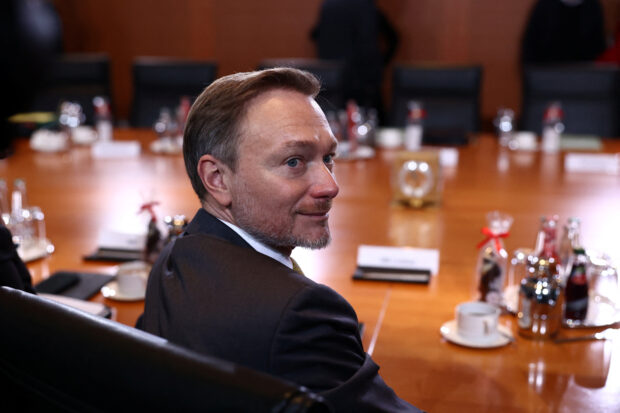German budget crisis seen dragging into next year as coalition haggles

German Finance Minister Christian Lindner attends the weekly cabinet meeting at the Chancellery in Berlin, Germany, Dec 6, 2023. REUTERS/Liesa Johannssen
BERLIN -The German government will not be able to finalize its 2024 budget before the end of the year, a senior ruling party official said on Thursday, as a fractious coalition tries to narrow differences on fixing a budget hole.
“This is however not a crisis,” German Finance Minister Christian Lindner said, playing down the need to get the budget through parliament before the end of the year.
“I have realized that the coalition partners have very ambitious timetables,” Lindner said on Thursday in Brussels.
He said that a political agreement on the structure of next year‘s budget was likely to come in a couple of days.
Chancellor Olaf Scholz’s three-way alliance is reeling from a court ruling last month that has thrown its finances into disarray and forced it to suspend a constitutionally enshrined “debt brake” for the 2023 budget.
Talks are focused on whether to also try to pause the limit on net new borrowing next year to plug a 17-billion-euro ($18.3 billion) budget gap, leaving spending on industrial projects, climate policy and welfare in limbo.
“The work has not yet been fully completed,” Lindner said.
Intensive discussions between Scholz, fiscally hawkish Lindner from the Free Democrats (FDP) and Economy Minister Robert Habeck from the Greens party have not achieved a breakthrough so far.
“Although we have done everything we can, the budget for 2024 can no longer be decided on time this year,” Katja Mast, a senior parliamentary leader in Scholz’s Social Democrats (SPD), wrote in a text message to lawmakers seen by Reuters.
READ: Stretched to breaking, Germany’s debt rule faces reform
Talks between the three coalition leaders are to continue on Friday and SPD sources have said they expect them to reach agreement on details before Christmas.
“Olaf is confident that a result can be achieved in the coming days,” said the text message.
A German government spokesperson had said earlier this week he expected the cabinet to agree on the budget this year but declined to be more specific.
The problem is, even if a deal is reached, there will not be time for the financial plans to go through parliament this year.
Industry concern
The haggling over the 2024 budget has sparked concerns from industry over support to keep companies competitive and prevent jobs from moving abroad.
The Greens have expressed worry that a new budget deal could cut Germany’s foreign aid, while Health Minister Karl Lauterbach warned in a Handelsblatt interview that cuts to the health budget would be damaging.
A central question is whether to lift Germany’s self-imposed limit on net new borrowing in 2024, a move Lindner fiercely opposes.
He bowed to pressure to suspend the cap, known as the “debt brake”, for this year but this week reiterated his opposition to doing that for a fifth straight year, saying that must not become the norm.
To suspend the debt brake, which restricts the public deficit to 0.35 percent of gross domestic product, the government can declare an emergency situation, such as the pandemic or energy price spike due to war in Ukraine. Parliament has to agree.
Lindner also opposes tax increases and wants to plug the budget gap mainly through cuts to spending.
READ: Budget crisis shakes industry’s confidence in Germany
“We don’t have to change anything about the debt brake, but rather remove all the bureaucratic and approval hurdles so that the existing money flows out,” he told WirtschaftsWoche weekly.
Scholz, who will face party members at a conference at the weekend, is loathe to agree to trimming spending on welfare benefits, such as unemployment pay, which the FDP favors.
Squabbling over the budget has raised tensions in the awkward three-way coalition, and polls show the big winners of the crisis are the opposition conservatives and far-right Alternative for Germany (AfD).
If no deal is reached, the coalition could collapse but most observers say it is in all the parties’ interests to hammer out an agreement and stay in power.
A temporary budget could kick in for next year if no agreement is finalized. This happens regularly after federal elections are held but before a budget has been agreed